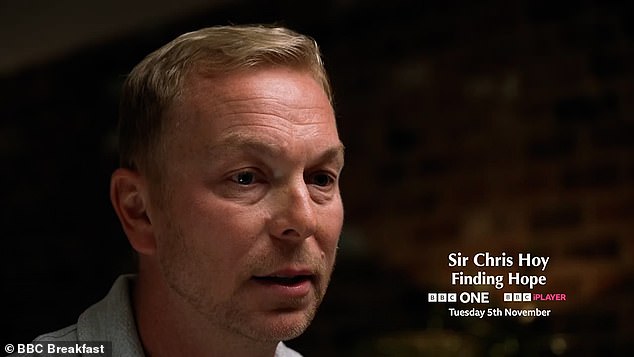Pictured: Sir Chris Hoy undergoes life-saving chemotherapy for deadly prostate cancer while wearing a handy device
Sir Chris Hoy has released never-before-seen footage of himself undergoing life-saving chemotherapy treatment for terminal prostate cancer.
The images show the 48-year-old cycling legend in a treatment chair with a bulky cap on his head as he grins at the camera.
The father-of-two explained that the hat is an ice cap, which is set at -27 degrees Celsius and is designed to minimize the risk of hair loss.
The images were released as part of a clip posted on BBC Sports‘s social media, ahead of an exclusive interview with the sporting legend, which airs on BBC1 tonight.
The clip also includes parts of the interview, in which Sir Hoy explains that he wasn’t initially ‘fussed’ about losing his hair, but changed his mind after hearing his nine-year-old son Callum’s concerns.
“My son Callum was quite concerned about what might happen,” said Sir Chris. ‘Are you going to lose your hair? (he asked). So for him I thought, this (wearing the cold cap) is something I want to do and it’s important to do. ‘
However, Sir Chris admitted that carrying the ice-cold device was far from easy.
“That was the biggest challenge,” he said. ‘It was terrible. It’s like torture.
Sir Chris Hoy is pictured wearing a cold cap designed to prevent hair loss during chemotherapy
‘The strategy was step by step. Just look at that second hand, around the clock. If you can do one more minute, that’s all you have to do.”
Cold caps are often used by patients undergoing cancer treatment to prevent hair loss.
The cooling effect reduces blood flow to the scalp, which also reduces the amount of chemotherapy medications reaching this area, thus limiting hair loss.
It is usually worn for 15 minutes before each chemotherapy treatment and is believed to reduce the risk of chemotherapy-induced baldness by about 50 percent.
The new images come during the six-time Olympic champion’s first interview after he revealed he had just two years to live due to advanced prostate cancer.
Sir Chris told the BBC: ‘That was the first thought in my head. How on earth are we going to tell the kids? It’s just this absolute horror, it’s a waking nightmare, a living nightmare.
“We just tried to be positive and say, you know what, this is what we do and you can help, because if I’m not feeling well, you can come and hug me, you can be supportive, you can help me. You can be happy, you can be kind to each other.

In an interview with the BBC last night, he described the ‘absolute horror and shock’ of being told that what he thought was just ‘ache and pain’ in his shoulder was actually a tumour.
‘I’m sure many families do it in different ways and I don’t think there is one right approach for anyone. There’s no one-size-fits-all, but for us I think this was the best way to do it.”
While Sir Chris said chemotherapy was ‘one of the biggest challenges I have ever seen and experienced’, he does his best to stay positive and sees chemotherapy as “a good thing, we are here to try to strike back, this will be a positive fight against the cancer.”
Sir Chris also took the opportunity to call for a wider range of prostate cancer testing.
Recalling how he had had “no symptoms, no warning, nothing” before his diagnosis, he said, “It makes sense to me – why not get the test done a little sooner?”
“Catch it before you need major treatment, it seems like a no-brainer to me.”
“Why not lower the age (and) allow more men to just go in and get a blood test.”
Following Sir Chris’s extremely moving testimony, NHS chiefs announced that the health service will consider whether to offer men over 45 a screening test.
Health Minister West Streeting said he had instructed officials to “look at whether we are in the right place when it comes to screening.”
